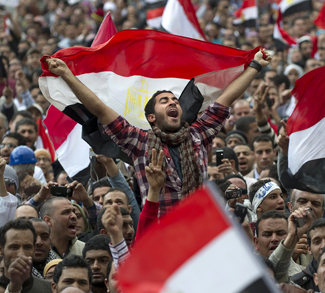The remnants of the old authoritarian order are still in place in Egypt. Despite frustration and impatience by Egyptians, the military council that is in charge in Egypt has delayed the transfer of power to a democratically elected civilian ruler. Were the hopes of an Egyptian democratic revolution an idealistic, far-fetched notion from the start?
Perhaps no other term has been more significantly misused and abused, in regards to the Arab spring, than the term ‘revolution.’ Back when the term retained an actual meaning, it conjured up images of an actual change in society where there was a transformation of the existing economic and political order and a reorganization of the state.
In the case of Egypt, people were hopeful that the end of the iron-fisted rule of long-time dictator, Hosni Mubarak, would usher in a new age of liberty and prosperity. Though largely unorganized and leaderless, Egyptians–predominately made up of young and tech savvy youth–took to the streets of Tahrir Square on January 25, 2011. They demanded the end of the emergency law that curbed civil freedoms for decades; they demanded better living conditions and an end to government corruption. When the government responded violently, the protests erupted into riots. Eventually, the few concessions made by Mubarak were enough to convince the protesters that with enough persistence and pressure they could force Mubarak to step down from power.
The protests were not only in response to the authoritarian practices of the regime but also to the lack of employment and the deteriorating economic conditions for the majority of Egyptians. The economic climate under the latter part of the Mubarak era was
characterized by close relationships between government officials and businesses. Under a crony capitalist system, government officials granted permits and afforded protection to the wealthiest elites of the business class.[1] A tremendous amount of wealth-inequality persisted from these government policies: Nearly 40% of Egyptians live with under $2 a day.
Unfortunately, very little has changed in eight months since Mubarak was forced to step down on February 11, 2011. Governing authority was handed over to the Supreme Council of the Armed Forces, led by Field Marshal Mohamed Tantawi, who served as the Minister of Defence under Mubarak. The Egyptian parliament was dissolved and the country’s constitution was suspended thereafter. It was indicated that elections would be
held in 6 months and the long-resented, tyrannical emergency law would be dissolved once peace and order was restored. But the emergency law remains intact, and in fact, amendments were made to that law in order to replace some of the older provisions with newer ones [2].
If the Egyptian constitutional referendum last March was any indication of how politically active Egyptians will be in a future democratic society, than the prospects are dim. Only 41% (or 18.5 million people) of a possible 45 million eligible voters turned out to cast their votes regarding presidential term limits and the criteria for presidential candidacy [3]. Granted, the referendum was merely a first step for a country that has lacked any genuine civic participation in national politics in modern history. But one would expect more enthusiasm for a population that is purported to be thirsty for democracy.
Largely absent from the media frenzy that surrounded the Egyptian protests, the highly organized Muslim Brotherhood (herein “Brotherhood) is the leading Islamist party in Egypt. Under the Mubarak era, they were banned from participating in Egyptian politics. In fact, the emergency laws in place were supposedly implemented on the grounds that the Brotherhood would sweep power in Egypt and would implement a theocratic-style regime similar to that of Iran if the laws were not in place to stop them. But that was largely a scare tactic used by the government to frighten the population into submission. Or was it?
Passive observers and secularists fear that civil society and democracy will be threatened by the Brotherhood’s aspiration for an Islamic state and the implementation of Islamic (Shariah) law in Egypt. Some have even made parallels between the Iranian revolution in 1979, that brought hope of change but produced another form of autocracy in the form of an Islamic republic, with the uprising in Egypt [4].
Perhaps one of the most critical questions is not whether the Muslim Brotherhood will play a role in the political process (that part is obvious). Instead the critical question is how significant their role will be in Egyptian politics.
Are the prospects of democracy challenged by the participation of the Brotherhood in Egyptian politics? Not necessarily. In fact, democracy stems from the will of the people, and if the will of the Egyptian people is to be governed by an Islamist political party, than those are their democratic aspirations. But the Egyptian people have shown their distrust and opposition with a regime that rules through fear and absolutism. So the next ruling party (or parties) must first gain the trust of the Egyptian people and distance themselves from the traditional form of authoritarian rule of the former Mubarak regime. Otherwise they run the risk of alienating themselves from the people who they are intending to
govern.
There are three challenges to democracy in Egypt. The first challenge will be a test of whether the military can peacefully hand over power to a new civilian government, or whether it will choose to covertly retain political power from behind the scenes. So far, the military council has reneged on its promises: it stated that emergency laws would be eliminated once order was restored, it promised elections within six months, and it indicated that the traditional form of rule by the old regime would be abolished. So far, it has failed to fulfill any of those pledges. And if the ratification of a new Constitution is prolonged, elections could come as late as April 2013–nearly 20 months later than planned [5].
The second challenge is how well Egypt can manage its first election. What will happen in the event of a gridlock? Will we see a situation similar to the March 2010 parliamentary elections in Iraq in which no government was formed until nearly 9 months later? Or can there be cooperation among the parties that form the government in the event that a single party cannot garner the majority of seats?
The last challenge will be whether democracy can endure or whether the new forces of the government resort to old tactics of the former regime and rule through decree. The first few months of the new leadership will be critical. There will be great deal of pressure to maintain stability, avoid corruption and repair the problems in Egypt, none of which will be an easy task.
Thus far we have seen the transfer of power from a civilian dictatorship to a military council (which is still…a dictatorship). In this regard, the jury is still out on whether there has actually been a ‘revolution’ much less a ’democratic revolution.’ The events that
unfolded are better categorized as a regime change.
It seems in the optimism and hysteria of the idealists, they lost sight of the fact that democracies aren‘t produced overnight. They take years to form, decades to strengthen and require many challenges to be overcome. It may be too soon and too pessimistic to blow the whistle on the-so called Egyptian transition to democracy. But it may also be the case that everyone put all of their eggs in one basket and were short-sighted in their calculation of a democratic revolution in Egypt. Egyptian democracy will take years (not months) to form and it is questionable whether Egypt will become a democracy or whether it will slip back into tyranny. In any case, I leave you with an Egyptian proverb to ponder: “Do not rejoice over what has not yet happened.”




